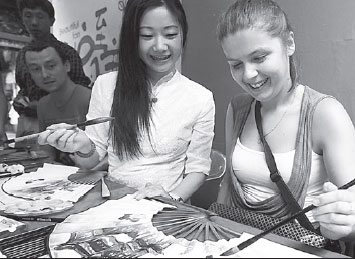Home> News
Growth follows 144-hour visa-free policy
Updated: 2016-09-08
( China Daily )
A 144-hour visa-free entry policy, which allows greater flexibility for foreigners who come to Shanghai and nearby provinces, has boosted the number of inbound tourists in the Yangtze River Delta.
The Shanghai General Station of Immigration Inspection said that as of Sept 1, more than 18,000 foreign tourists this year had taken advantage of the policy to enter Shanghai for a short stay - 60 percent more than in 2015.
Since Jan 30, when China enacted the expanded visa-free policy, eligible visitors or businesspeople traveling in the Yangtze River Delta area - Shanghai, Hangzhou or Nanjing - automatically qualify for 144 hours for business or simply to explore the region. Visitors from 51 countries can enjoy the policy, including the United States, the United Kingdom and Japan.
In the past, Shanghai and other important mainland tourism destinations only offered a 72-hour visa-free stay for inbound foreign visitors. Travel industry insiders say the average stay of foreign visitors is around 102 hours.
"I think it is a useful policy for travelers who pass by Shanghai for a short stop then leave for another country. I've recommended it to some of my friends back in Canada who plan to take a trip to Asia," said Naeim Mahdavi, a Canadian teacher working at the High School Affiliated with Shanghai Jiao Tong University.
With 144 hours and an enlarged region that includes Jiangsu and Zhejiang provinces, more foreign tourists will take advantage of the convenience, Mahdavi said.
Industry insiders all attribute the growth to a rebound in inbound tourism in China. In the first half of this year, just under 68 million visits were paid by overseas visitors, a jump of 3.8 percent year-on-year. Visits by foreigners reached 13.47 million, a 9 percent increase.
Liu Simin, vice-president of the tourism branch of the China Society for Futures Studies, said China should take a more active approach in exploring tourism resources in addition to ancient cultural history and natural landscapes.
"Decades have passed, but the most popular tourism destinations haven't changed. We should provide something more besides the Great Wall, the Palace Museum and the Summer Palace," he said. "China is too big for one trip. We should provide a friendly environment so that visitors will come for a second or third trip, and even recommend China to their friends and relatives."
"And this means China needs a new way of introducing itself and a foreign-friendly environment for inbound tourists," he added.
|
A foreign tourist learns to paint on a traditional Chinese fan in Shanghai in July. Liu Ying / Xinhua |















